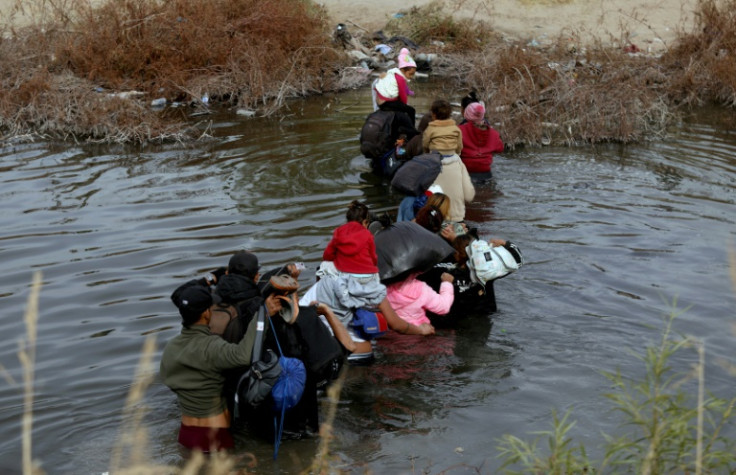
Humanitarian workers, attorneys, and shelter directors operating along the Texas-Tamaulipas border have raised alarms about a concerning escalation in the dangers faced by migrants and asylum seekers in the area, with kidnapping and extortion of migrants reaching unprecedented levels since late 2023.
Interviews conducted by WOLA from February to early March 2024 show that the Texas-Tamaulipas border, particularly the Rio Grande Valley, has become a particularly perilous route for migrants seeking entry into the United States. So much so that Tamaulipas bears a "level four—do not travel" designation from the State Department, akin to Afghanistan's danger level.
Criminal groups in Tamaulipas profit significantly from illicit activities, including drug trafficking, human trafficking, and migrant smuggling. The restrictive U.S. border policies exacerbate the situation, directing migrants into the hands of these criminal enterprises, the report says.
Kidnappings, often accompanied by physical and psychological violence, have become rampant, with criminals targeting migrants using various modes of transportation and sometimes with the complicity of Mexican authorities.
Sexual violence against migrants, particularly women, has also witnessed a surge. Reports indicate an increase in sexual assaults, rapes, and even gang rapes, perpetrated not only against women but also men and children. Doctors Without Borders noted a significant rise in sexual violence consultations in Reynosa and Matamoros, underscoring the harrowing experiences faced by migrants.

Mexican authorities, instead of providing protection, are either complicit or turn a blind eye to the atrocities, the report claims. Numerous accounts have surfaced of authorities colluding with organized crime groups, selling migrants to cartels, or disregarding reports of kidnappings and assaults. This collusion extends to Mexico's migration authorities, who control access to U.S. ports of entry, sometimes demanding payment or collaborating with criminal elements.
In fact, Border Report recently shed light on a growing number of migrants are accusing members of Mexico's Border Patrol of sexual abuse and theft at the moment of getting apprehended close to the border. Several of them said they were recently subjected to sexual abuse as they attempted to cross into the U.S. through the mountains east of San Diego. They said they were also robbed, being asked for $2,500 per person and told that they would have to work to access the border.
The U.S. border policies, criticized by WOLA for exacerbating the crisis, limit asylum seekers' options, pushing them into perilous situations in Tamaulipas. The "metering" practice, akin to outsourced metering by Mexican authorities, further exposes migrants to kidnapping and violence. Despite the known risks, U.S. officials have failed to adjust policies or allocate resources to mitigate the dangers faced by migrants, the report adds.
In response to the escalating crisis, the organization makes a series of proposals for both the U.S. and Mexican governments. These include increasing CBP One appointments in safer border areas, processing asylum seekers promptly, and ensuring deportations consider security concerns. Mexican authorities, on their end, are urged to prevent systematic kidnapping patterns, respond promptly to reports, and prosecute perpetrators.
The transnational nature of migrant kidnappings underscores the need for bilateral cooperation to combat the scourge effectively, according to the report. The U.S. Congress has allocated funds to address migrant kidnappings, emphasizing the importance of prioritizing this issue in bilateral collaborations. Both governments must ensure that victims can report crimes regardless of their immigration status, emphasizing a shared responsibility in tackling the crisis, it adds.
The testimonies and findings also illustrate the urgent need for comprehensive action to address the humanitarian crisis unfolding along the Texas-Tamaulipas border. As migrants continue to face the mentioned hardships, the onus lies on governments to uphold their obligations and protect the vulnerable, ensuring that no one suffers such atrocities merely for seeking safety and asylum.
WOLA also requests additional resources for implementing effective measures to curb the surge in kidnappings and violence be allocated by authorities from both countries. Moreover, fostering international cooperation and intelligence-sharing mechanisms can help dismantle criminal networks responsible for preying on vulnerable migrants.
Furthermore, addressing the root causes of migration, such as poverty, violence, and lack of opportunities in migrants' countries of origin, is essential for long-term solutions, the report adds. Investing in economic development, education, and security in these regions can alleviate the pressure driving people to undertake perilous journeys in search of a better life.
Mexican President Andrés Manuel López Obrador has made this request to the U.S., saying the country should invest at least $20 billion to address the root causes of migration. The issue has generated different responses from political leaders.
On the one hand, Vice President Kamala Harris recently announced a series of investments with that purpose during a visit by Guatemalan President Bernardo Arévalo. On the other, former President Donald Trump rejected any investment, saying: "It's very simple: lack of respect for the president. They would never say that to me. They would never ask it. I wouldn't give them 10 cents."
© 2024 Latin Times. All rights reserved. Do not reproduce without permission.
Arizona Democrats garner enough votes to repeal 19th-century law banning most abortions
Colombian President Petro announces country will sever diplomatic ties with Israel amid Gaza conflict
New Mexico Republicans Urge Gov. Lujan to deploy National Guard to border amid smuggling and fentanyl crisis
Almost four in ten Latinos report being called a racial slur in the past year
